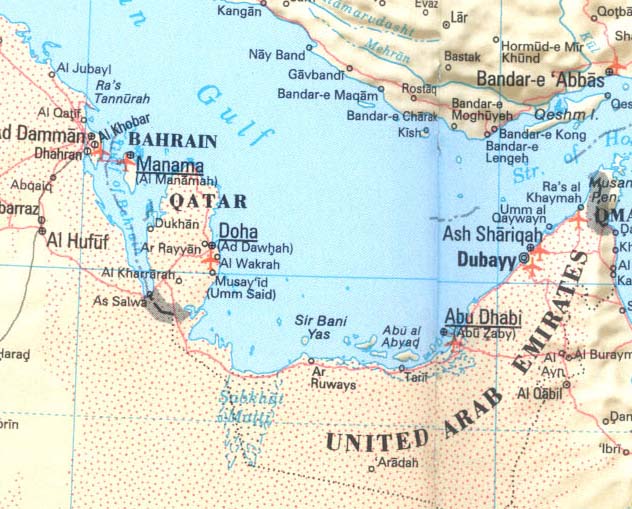When I arrived in this country in 2007 the daily high commuter traffic was quite dangerous with roundabouts carrying traffic well beyond capacity and cars, trucks and buses competing to be in and through the round-about before the others. Shortly after I arrived, traffic cops were stationed at the most heavily trafficked roundabouts to stop traffic from individual directions and attempt to keep a semblance of free movement. The next step was the addition of traffic signals again at the most heavily trafficked roundabouts. Here the red signals stop, the green go and the flashing yellow, what I term, ‘proceed if you dare.’ On a green light you must make certain that that no one is cutting across you from the left, moving legally on a yellow flashing. Yet this is a much better system.
Also in 2007 some new safety signs, in both Arabic and English, began to appear at major intersections and roundabouts. As the
Qatar Visitor reported at the time
New traffic signs have sprung up around Doha in the last few weeks, warning of the dire consequences of breaking the strict new traffic laws.
They illustrated some of the informative signs:


Other signs today range from the very benign (a picture of a smiling young girl, ‘Keep your family safe’) to the slightly more menacing (another smiling girl, this time with the admonition, ‘don’t lose your child’s smile by accident) to the downright menacing (a crumbled car and blood dripping from a stop sign). The latter two I illustrate here; the English version of the dripping blood sign reads 'Take Care, Follow the Traffic signs to be safe.' I no longer see the one with a chalk outline of a body on the pavement.


Traffic is far better now although there are still far too frequent acts of challenge and high speeds when in heavy traffic. Still continuing is the late night practice of drag racing along the highways out of town. A few months ago a prominent, highly talented young Qatari was killed when inadvertently caught in such a ‘race.’ He was the recently named Minister of Business and Trade. The language from the recent trial describes the race and needs no further commentary. It appeared in the July 21 edition of Qatar newspaper
The Peninsula.
Racing of two cars caused minister’s death: Witness
Web posted at: 7/21/2009 3:1:3
Source ::: QNA
DOHA: A witness deposing in a trial court confirmed that the car which hit the vehicle of the business and trade minister in May causing his death, was involved in a daredevil racing on Doha-Al Wakra highway. The witness was driving and coming in from the direction of the racing cars from Al Wakra, while the minister, H E Sheikh Fahad bin Jassem Al Thani, was coming from the opposite direction in his car and heading towards Al Wakra.
The witness told the court presided over by Judge Nasser bin Mohamed Al Dosri that when the two cars sped past his, their speed was so much ‘maddeningly high’ that his vehicle shook.
While one of the cars sped past his from the right, the other one on the left took to the service road in what looked like a ‘daredevil racing. “The two four-wheelers sped past my car in split second,” he said.
And soon the car on the service road approached the main highway, it kissed the other vehicle. This caused one of the cars to collide with the divider and cross over to the other side of the road. It first hit an electric pole and later the car of the minister which was coming in from the opposite direction, said the witness.







